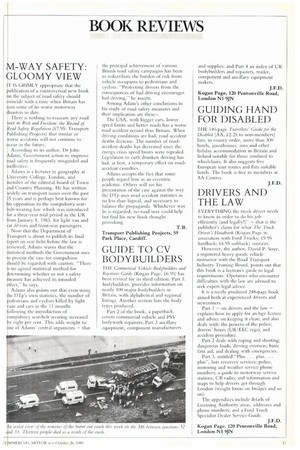IT IS GRIMLY appropriate that the publication of a controversial
Page 59

If you've noticed an error in this article please click here to report it so we can fix it.
new book on the subject of road safety should coincide with a time when Britain has 5een some of its worst motorway disasters to date.
There is nothing to reassure any road user in Risk and Freedom: the Record of Road Safety Regulation (0.95; Transport Publishing Projects) that similar or worse accidents will not continue to occur in the future.
According to its author, Dr John Adams, Government action to improve toad safety is frequently misguided and ineffective.
Adams is a lecturer in geography at University College, London, and member of the editorial board of Town and Country Planning. He has written widely on transport issues over the past 5 years and is perhaps best known fbr his opposition to the compulsory seatbelt-wearing law which was introduced for a three-year trial period in the UK from January 1, 1983, for light van and car drivers and front-seat passengers.
Now that the Department of Transport is about to publish its final report on seat belts before the law is reviewed. Adams warns that the !tatistical methods the Government uses to present the case for compulsion thould be regarded with caution. "There is no agreed statistical method for determining whether or not a safety measure has achieved its intended effect," he says.
Adams also points out that even using the DTp's own statistics, the number of pedestrians and cyclists killed by light vans and cars in the II months following the introduction of compulsory seat-belt wearing increased by eight per cent. This adds weight to one of Adams' central arguments — that the principal achievement of various British road safety campaigns has been to redistribute the burden of risk from vehicle occupants to pedestrians and cyclists, "Protecting drivers from the consequences of bad driving encourages had driving," he asserts.
Among Adam's other conclusions in his study of road safety measures and their implication arc these: The USA, with bigger cars, lower speed limits and better roads has a worse road accident record than Britain. When driving conditions are bad, road accident deaths decrease. The number of roadaccident deaths has decreased since the energy crisis speed limits were repealed. Legislation to curb drunken driving has had, at best, a temporary effect on roadaccident casualties.
Adams accepts the fact that some people regard him as an eccentric academic. Others will see his presentation of the case against the way the DTp uses road accident statistics as no less than logical, and necessary to balance the propaganda. Whichever way he is regarded, no road user could help but find his new book thought provoking.
T.B.
Transport Publishing Projects, 59 Park Place, Cardiff.








































































































